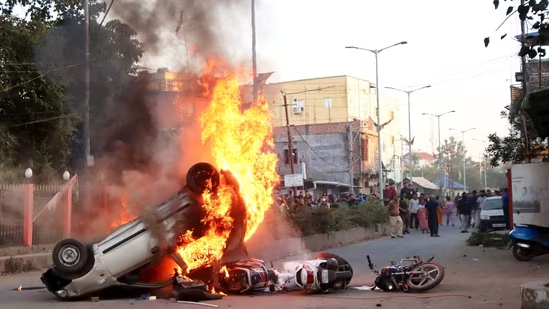In a dramatic escalation of unrest in Manipur, angry protesters stormed the residence of Chief Minister N. Biren Singh, along with the homes of other key ministers, following the discovery of the bodies of two women and a child in the state. The incident has reignited intense protests, calling for justice and greater accountability from the authorities. Here’s a breakdown of the situation and what it means for the region:

The Triggering Incident
The violence and protests were sparked by the grim discovery of the bodies of two women and a child. The victims were found in a highly distressed state, adding to the already volatile atmosphere in Manipur. Many have linked the incident to ongoing ethnic violence in the region, which has seen clashes between different communities in recent months. The brutal killings have fueled anger, prompting widespread protests in various parts of the state.
Rising Unrest and Public Anger
Protesters, many of whom were from the ethnic communities affected by the violence, stormed the homes of the Chief Minister and several other ministers. They demanded immediate action against those responsible for the killings and sought a swift investigation into the incident. The protesters’ anger was fueled by accusations that the state government had failed to address the ongoing conflict and had not done enough to ensure the safety of the residents, particularly women and children.
The Political Fallout
The storming of the CM’s residence is a direct challenge to the ruling government, and it highlights the deepening divide and mistrust between the people and the administration. While Chief Minister Biren Singh has condemned the killings, critics argue that his administration’s response to the escalating violence has been insufficient. The situation is now being closely monitored by national and international bodies, with calls for accountability and peacebuilding efforts to address the ethnic strife.
Manipur’s Ongoing Crisis
The state of Manipur has been grappling with ethnic violence for months, primarily between the Meitei community and the Kuki-Zo tribal groups. The tension erupted after the state government’s decision to grant Scheduled Tribe status to the Meitei community, a move that was perceived as discriminatory by the Kuki-Zo groups. Since then, there have been numerous clashes, leading to the displacement of thousands of people.
The recent killings and the subsequent protests reflect the deepening rift between the different ethnic groups in the state. The situation remains fluid, with ongoing efforts by local authorities to restore order and investigate the incident.
What’s Next for Manipur?
With tensions running high and the protests showing no signs of abating, the question now is how the state government will respond. Many have called for an independent investigation into the deaths, along with urgent steps to bring an end to the ethnic violence that has gripped the state. The involvement of security forces, as well as efforts to initiate peace talks, will be key in determining the future course of events.
Additionally, this incident has highlighted the need for greater attention to the safety and rights of women and children in conflict zones. Human rights organizations have raised alarms over the increasing vulnerability of women in the region, who often become the victims of sexual violence and other forms of brutality during times of ethnic conflict.
The storming of the Chief Minister’s residence in Manipur is a stark reminder of the deepening crisis in the state. As protesters demand justice for the victims, the government faces mounting pressure to take decisive action. Whether the state can navigate these turbulent waters and restore peace will depend on its ability to address the underlying issues of ethnic division and ensure that justice is served for all victims of violence.
Stay tuned as the situation unfolds, and we continue to track developments in Manipur and its impact on the broader region.

Pingback: 5 Soldiers Killed as Army Vehicle Falls into 300-Feet Gorge in J&K's Poonch -